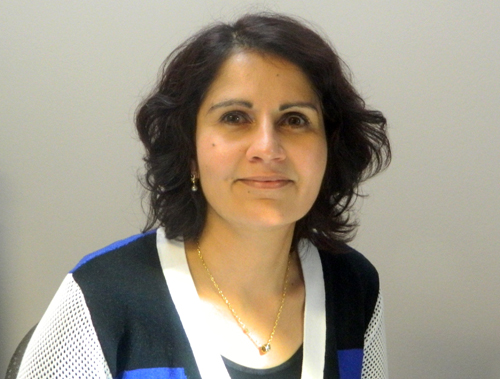
About 80 per cent of OVC students will opt to start in veterinary general practice. That means they not only need to know what Prof. Deep Khosa calls the “nuts and bolts” of veterinary medicine – the anatomy, biochemistry and other information that provides the basis for caring for animals – but they also need the skills to talk to clients, interact with animals and work with other veterinarians.
OVC gives students the opportunity to practice all of those skills at the Hill’s Pet Nutrition Primary Health Care Centre (PHC). The Smith Lane Animal Hospital, located within the centre, provides preventive care, such as vaccinations and check-ups for pets, as well as treatment for illnesses. No referral from a veterinarian is needed.
“Because so many students will go into primary care practice, it’s important that the learning they do at the PHC be the best possible learning experience,” says Khosa. She will study current approaches to teaching and assessing the outcomes so that she can suggest new ways to make the learning process more effective for those about to become veterinarians.
Khosa’s interest in teaching veterinary students is built on a solid foundation of experience in the field – even though that field was on the other side of the planet. She grew up in Perth, Australia, and attended Murdoch University there, completing the Australian equivalent of a DVM degree.
She then worked in primary care practice for 17 years, while furthering her education with a special interest in small-animal medicine. In 2001, she began teaching and practising at Murdoch University’s Veterinary Hospital. “This is when my interest in veterinary education started,” she says.
Veterinary students are often thought of as solitary learners. They have been trained to learn this way, thanks to traditional approaches in schools, and they have been very successful on their own. However, Khosa says that collaborative learning offers additional strengths and is closer to the way most people work. Veterinarians, for example, often need to collaborate with each other or with specialists to figure out the best course of treatment for each animal.
With this new area of interest in mind, Khosa completed her PhD in veterinary education in January and started at U of G later that month. Her thesis research examined the factors that helped students succeed in a group-based assignment.
Khosa recorded the conversations of veterinary students as they discussed their projects and carefully analyzed what they said — not including the parts where students discussed their love lives and other social activities.
“It was a very long and laborious process,” she admits. She coded the comments as high- or low-level cognitive, or high- or low-level meta-cognitive. For example, if someone talked about a clinical concept and elaborated on it, that would be a higher-level cognitive discussion. If another person simply read a section out of a textbook, Khosa rated that as a lower-level cognitive action.
Meta-cognitive thinking is “thinking about your thinking,” she explains. Coming to a conclusion and then asking yourself, “Why is that so and how does that happen?” is meta-cognitive. “It’s how you think about what you are learning, even considering why something doesn’t make sense to you,” she says.
The final analysis showed that the group that produced the best work on the assignment had higher cognitive and meta-cognitive scores, whereas the group that did not perform as well rated lower in their qualitative and quantitative scores
Khosa says that it is possible to teach higher-level cognitive and meta-cognitive thinking, and the logical follow-up to that study would be to introduce an intervention to do that.
Those new studies will have to wait a bit, though. Khosa is currently focused on collecting data about student learning at the Primary Health Care Centre and is looking forward to seeing how this could be improved.
She’s also settling into Guelph with her husband and three cats. “My husband and I love travelling and exploring new places, so we are looking forward to discovering Canada and the U.S.,” she says. “We also love going to new restaurants and have been to several in Guelph already.” Khosa also loves to run and looks forward to running outdoors once the weather warms up. She joined a gym for the first time when she saw the icy streets in Guelph this past January.